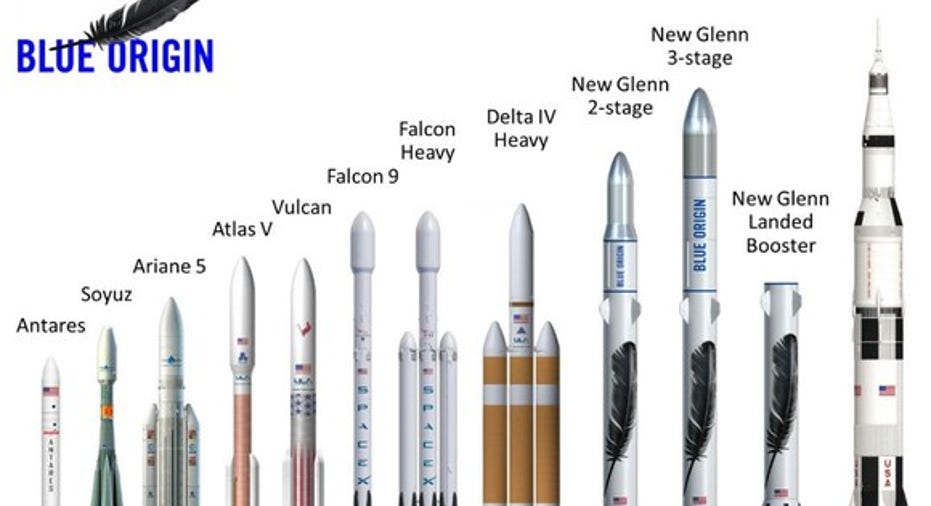Jeff Bezos' Next Project Will Amaze You

Blue Origin aims to be the biggest thing in spaceflight since the Apollo missions. Image source: Blue Origin.
One thing you have to hand Amazon.com (NASDAQ: AMZN) CEO Jeff Bezos: As the leader of the biggest retailer on the planet by market cap, he sure does know marketing.
Bezos, as you know by now, is not just the CEO of Amazon.com. He's also parlayed the billions he made selling books (and everything else) online into the creation of a new space company. Dubbed Blue Origin and operating out of a facility set up in the West Texas desert, Bezos' space concern promises to give space incumbents Boeing (NYSE: BA) and Lockheed Martin (NYSE: LMT) a run for their money -- and is already running neck and neck with Elon Musk's SpaceX -- albeit, with different objectives.
While SpaceX aims to cut the cost of putting satellites in orbit, to date, Blue Origin has focused primarily on developing a reusable rocket to send space tourists up 62 miles to the edge of space, then safely land them back on Earth -- over and over again. Four straight flights of its New Shephard rocket have gone off without a hitch, and put Bezos on the road to creating a viable space tourism business.
But it's Bezos' latest plan that will really wow you.
Bigger, faster, better
While many companies in the space "space" have chosen to dodge competition with Boeing and Lockheed by focusing on the development of small rockets to carry microsatellites into space (a market the larger companies view as an afterthought), Bezos is going bigger. Building on experience gained flying New Shephard, and pairing it with the BE-4 engine that Blue Origin is developing for Boeing and Lockheed Martin's United Launch Alliance, Bezos now plans to build two new rockets capable of reaching orbit -- and beyond.
Bezos' plans first materialized two months ago, when he broke ground for the construction of a new rocket factory. As depicted in the illustration up above, the rockets churned out at the new fab are going to be huge ... and huger:
The first, a two-stage New Glenn launch vehicle, will measure 23 feet in diameter and stand 270 feet tall. Powered by seven BE-4 engines, it will produce 3.85 million pounds of thrust at liftoff -- more than twice the power of SpaceX's smaller Falcon 9, nearly twice that of the Boeing-designed Delta IV Heavy, and more than four times the power of a Lockheed Martin-designed Atlas V. And like SpaceX's Falcon, New Glenn's first stage will be reusable. As for the second stage, it will be powered by an additional BE-4 engine, this one optimized to work in a vacuum. Blue Origin says it intends to begin launching New Glenn "before the end of this decade" on both commercial satellite missions, and also "to fly humans into space."
Blue Origin's second orbital rocket will also be named "New Glenn," but feature a third stage powered by a single BE-3 engine. (That's the same engine that powers the suborbital New Shephard, but this one will be tweaked to work better in vacuum). Adding this third stage will increase the rocket's total height to 313 feet. And with this addition, Blue Origin cryptically confides that the rocket will be "capable of flying demanding beyond-LEO missions."
Bigger, faster, better ... farther?
Precisely how far beyond Low Earth Orbit does Blue Origin intend to fly? To geosynchronous orbit, to the Moon, or even farther than that? Blue Origin declines to say.
What the company does say, though, is that it has a "vision" of "millions of people living and working in space" -- a vision at least 1,000 times broader than United Launch Alliance's prediction of 1,000 astronauts in space.
Blue Origin calls "New Glenn is a very important step" toward that goal. But what's more important to investors is the fact that with New Glenn, Blue Origin appears to be "stepping" into the ring to compete for commercial satellite launches, for transportation of astronauts to the International Space Station, and potentially for trips farther out as well.
Even more interesting is the fact that Bezos plans to launch New Glenn "before the end of this decade." This implies the new rocket will arrive almost simultaneously with ULA's Vulcan rocket, and Arianespace's Ariane 6. All that competition is not going to be good for space companies' profits -- but it could be very good for their customers, and for the development of the space industry as a whole.
A secret billion-dollar stock opportunity The world's biggest tech company forgot to show you something, but a few Wall Street analysts and the Fool didn't miss a beat: There's a small company that's powering their brand-new gadgets and the coming revolution in technology. And we think its stock price has nearly unlimited room to run for early in-the-know investors! To be one of them, just click here.
Fool contributorRich Smithdoes not own shares of, nor is he short, any company named above. You can find him onMotley Fool CAPS, publicly pontificating under the handleTMFDitty, where he's currently ranked No. 280 out of more than 75,000 rated members.
The Motley Fool owns shares of and recommends Amazon.com. Try any of our Foolish newsletter services free for 30 days. We Fools may not all hold the same opinions, but we all believe that considering a diverse range of insights makes us better investors. The Motley Fool has a disclosure policy.



















